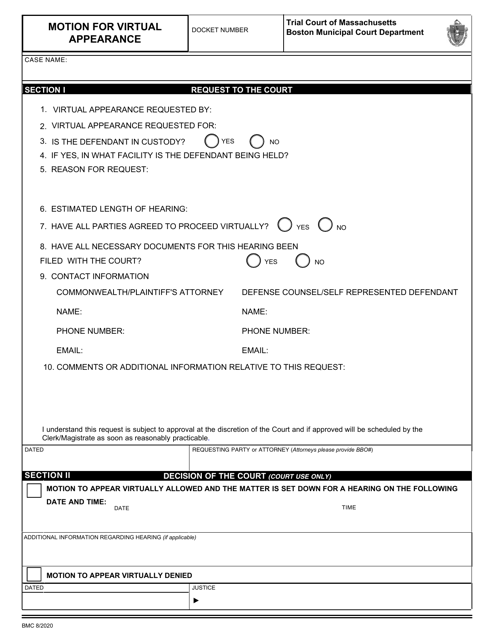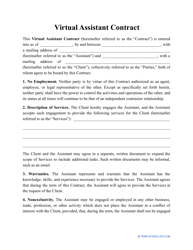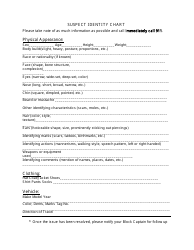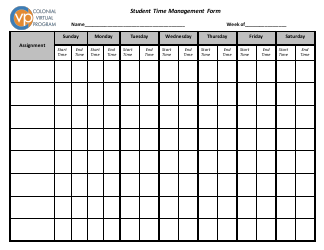Motion for Virtual Appearance - City of Boston, Massachusetts
Motion for Virtual Appearance is a legal document that was released by the Municipal Court Department - Boston, Massachusetts - a government authority operating within Massachusetts. The form may be used strictly within City of Boston.
FAQ
Q: What is a Motion for Virtual Appearance?
A: A Motion for Virtual Appearance is a request to participate in a court hearing or legal proceeding remotely, using video conferencing technology.
Q: Why would someone file a Motion for Virtual Appearance?
A: Someone may file a Motion for Virtual Appearance to request permission to appear in court or attend a legal proceeding without being physically present, for reasons such as distance or health concerns.
Q: How can I file a Motion for Virtual Appearance in the City of Boston, Massachusetts?
A: To file a Motion for Virtual Appearance in the City of Boston, Massachusetts, you should consult the specific rules and procedures of the court or legal entity where your case is being heard.
Q: Are there any requirements to be eligible for a Virtual Appearance?
A: The specific requirements for a Virtual Appearance may vary depending on the court or legal entity. It is advisable to consult the rules and procedures of the relevant authority.
Q: What is the benefit of participating in a Virtual Appearance?
A: The benefit of participating in a Virtual Appearance is that it allows individuals to attend court hearings or legal proceedings remotely, saving time and expenses associated with travel and accommodation.
Q: Can all court hearings be attended through Virtual Appearance?
A: Not all court hearings may be eligible for Virtual Appearance. Certain hearings or proceedings may require physical presence. It is important to check the specific rules and procedures of the court.
Q: Can I request a Virtual Appearance for any legal proceeding?
A: The eligibility of a Virtual Appearance may depend on the type of legal proceeding and the discretion of the court or legal entity. It is best to consult the specific rules and procedures.
Q: Can I present evidence or arguments during a Virtual Appearance?
A: Yes, in many cases, participants in a Virtual Appearance can present evidence and make arguments remotely. However, there may be specific guidelines and procedures to follow, depending on the court or legal entity.
Q: What technology is typically used for Virtual Appearance?
A: Video conferencing technology, such as Zoom, Webex, or Microsoft Teams, is commonly used for Virtual Appearances. The specific platform may be determined by the court or legal entity conducting the proceeding.
Q: Can I have legal representation during a Virtual Appearance?
A: Yes, you can have legal representation during a Virtual Appearance. Your attorney or legal representative may also appear remotely through video conferencing technology.
Q: Can I object to a Virtual Appearance?
A: Depending on the rules and procedures of the court or legal entity, you may have the right to object to a Virtual Appearance. It is advisable to consult with your attorney or legal advisor for guidance.
Q: What happens if my Motion for Virtual Appearance is denied?
A: If your Motion for Virtual Appearance is denied, you may be required to appear physically in court or attend the legal proceeding in person, as determined by the court or legal entity.
Form Details:
- Released on August 1, 2020;
- The latest edition currently provided by the Municipal Court Department - Boston, Massachusetts;
- Ready to use and print;
- Easy to customize;
- Compatible with most PDF-viewing applications;
- Fill out the form in our online filing application.
Download a fillable version of the form by clicking the link below or browse more documents and templates provided by the Municipal Court Department - Boston, Massachusetts.




